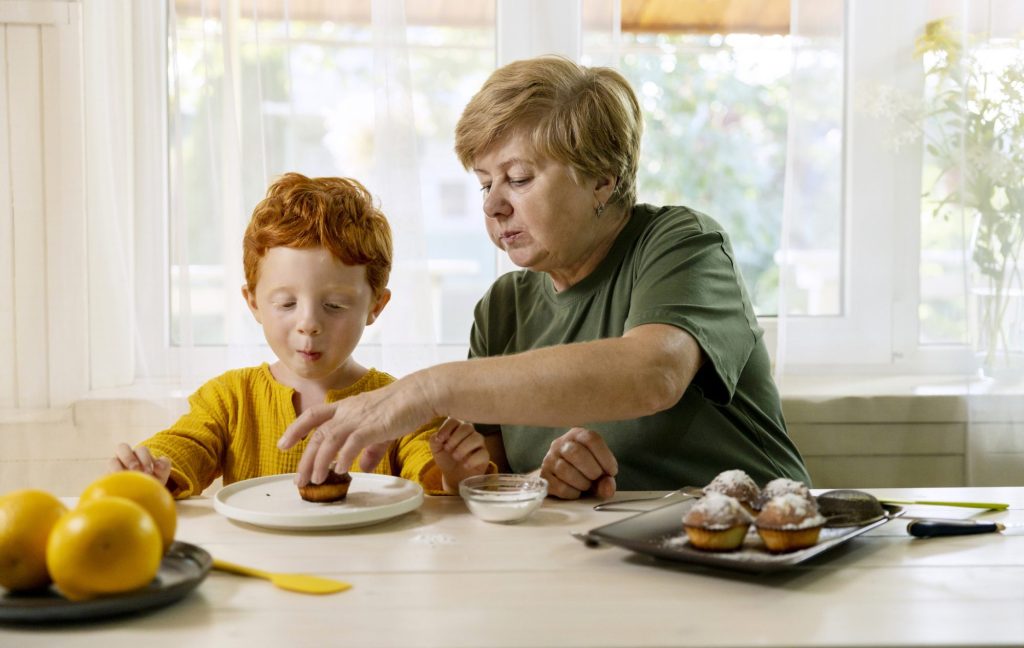Emotional feeding
Summary
- Emotional feeding is using food for reasons unrelated to appetite and meals.
- Using food for emotional reasons can increase long-term desire for those foods and emotional eating.
- Children can learn to use high sugar, high fat foods for physical/emotional pain and to regulate emotions.
- Children need to learn to manage their emotions without relying on food.
- Using food for emotional reasons is common outside the house and with other people. This can be limited by avoiding risky situations or by talking with others.
On this page
Using food for emotional reasons
This section discusses using food for reasons unrelated to hunger, such as for emotional reasons. This can be using food as a bargaining tool, to calm, comfort and distract toddlers, to get them to do something, to eat something, or withholding food as a punishment. This is also common outside the home where food is used to reward, celebrate and ‘to be nice’. The most common foods used in emotional eating are high in fat, sugar or salt.

For example, food can be used…
- to get toddlers to behave or for some peace and quiet.
- for achieving or doing something we want them to “If you pick up your toys, I’ll give you a biscuit”.
- to celebrate doing something good “Very good dancing now let’s get you a chocolate bar”.
- to eat another food “If you eat these you can have ice cream”.
- if they are upset or hurt. “You’re upset you’ve broken you Lego, have some cheeso’s”.
Parents, carers and others can realise the effectiveness and power of sweet or other favourite foods, in achieving something with their toddler or child. These foods are our favourites, they are delicious, they have a place in our life, but it’s how they are used which is important.
Guaranteed to please!

When others use emotional feeding on your child.
Using food for emotional reasons can be really common with grandparents, other family, other parents, sports coaches and doctors, as children grow older. It can be frustrating when this takes away from your role of providing food. As we know once the food has been made available it’s our child’s decision to eat or not.
 Emotional eating in adulthood
Emotional eating in adulthood
Using food for emotional reason is a form of coercion like pressure to eat and restriction, and has similar long- and short-term outcomes. When children are used to being provided high sugar, high fat foods whenever they’re faced with physical or emotional pain, they can become reliant on treats to help them regulate their emotions. This can be the cause of adult’s dealing with emotion by eating high fat, high sugar foods.
Children need to learn to manage their emotions without relying on food
When they are hurt and upset
There is a big difference between providing foods to soothe when you toddler or child is upset and when they are really hurt. Using food to calm can be helpful if a child is in real pain, but if we jump to using food for any type of upset or distress it will soon become the child’s fall back.
Children need to learn to deal with their big emotions. Their sadness, their upset, their boredom are a part of life. We need to support our children to learn to deal with their ‘upsets’ without it triggering emotional eating.

Instead of food rewards…
Instead of using food for emotional reasons we can celebrate and reinforce good behaviour with non-food rewards such as:
- stickers or bubbles
- one-on-one play time
- the child gets to choose the next activity
- the child gets to choose what book is read at story time
- trips to cool places.
We can include those ‘favourite foods’ (sweets, chocolate, lollipops) with meals. We therefore maintain the feeding roles, letting your child decide whether and how much to eat once you’ve served up.
Be aware of risky places
If you are going to places where they always give out food rewards for ‘good toddlers’ then try to have the option of avoiding them. Once they’ve been offered the food it’s very difficult to then say ‘NO’ they can’t have it. This will be overt restriction, something we also want to try and avoid.
Have a word…
…with Uncle, Aunty, Nanna, Grandad, Doctor, Swimming teacher or whoever is using food for emotional reasons. Sometimes this can be an uncomfortable conversation, but if it’s happening regularly, you may need to address it. You might find there are other parents or family who share your thoughts.
If they get spoiled by family and it doesn’t happen regularly enough to impact overall nutrition, by all means let spoiling go! Remember it’s what we do most of the time!

- Yee, A.Z.H., Lwin, M.O. & Ho, S.S. The influence of parental practices on child promotive and preventive food consumption behaviors: a systematic review and meta-analysis. Int J Behav Nutr Phys Act 14, 47 (2017). https://doi.org/10.1186/s12966-017-0501-3
- Farrow CV, Haycraft E, Blissett JM. Teaching our children when to eat: how parental feeding practices inform the development of emotional eating–a longitudinal experimental design. Am J Clin Nutr. 2015;101(5):908-13.
- DiSantis KI, Hodges EA, Johnson SL, Fisher JO. The role of responsive feeding in overweight during infancy and toddlerhood: a systematic review. Int J Obes (Lond). 2011;35(4):480-92.
